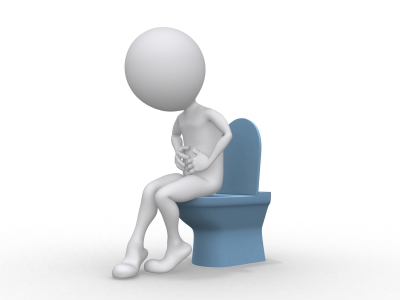Irritable Bowel Syndrome (IBS) Symptoms, Causes, Treatment
What is Irritable Bowel Syndrome (IBS)?

Irritable bowel syndrome (IBS) is a common disorder of the bowel (large intestine, also called the colon) which leads to abdominal pain, discomfort and distress for the sufferer. It is also known as functional bowel syndrome, spastic bowel, irritable colon, and spastic colon.
It should not be confused with the more serious inflammatory bowel disease (IBD) which includes Crohn's disease and ulcerative colitis. These show structural changes and inflammation to bowel tissue whilst IBS does not.
Irritable bowel syndrome does not cause any permanent physical damage to the intestines. And it does not lead to serious diseases, tumors or cancer. So, although it is a very unpleasant disorder, the good thing is that it normally poses no serious health risk.
Unfortunately there is no cure for irritable bowel syndrome, but it can be managed by some changes to things like your lifestyle and diet. Certain medications can help, as can psychological interventions in some cases. By taking such action to control their symptoms, most people with IBS can reduce their impact on their everyday lives. However, a minority of sufferers will have symptoms severe enough to be disabling.
Who is At Risk of IBS?

It is believed that up to 20% of the adult population may have IBS. But since many people do not seek medical help, because they are unaware that they have the problem, it is difficult to give an exact figure. However, it is known that it is more common in females than in males. And it is believed that irritable bowel syndrome starts before the age of 35 in around 50% of sufferers, even from the early teens.

What Are the Symptoms of IBS?
Apart from the pain and discomfort mentioned above, common irritable bowel syndrome symptoms are things such as...
- flatulence (gas / wind)
- bloating
- bowel movement urgency
- diarrhea
- constipation
Someone with IBS may even have alternating diarrhea and constipation. Sometimes mucus can be seen on the stools, and there can be times when the sufferer has the feeling that they have not been able to fully empty their bowels.
Such symptoms vary from person to person and their intensity varies widely too. Some people may suffer bouts from time to time whilst others can have chronic IBS where the symptoms are present most of the time. And there are some studies that suggest that up to 60% of IBS victims suffer from anxiety or depression.
Some people do not realize that they have irritable bowel syndrome and their symptoms are such that they do not seek medical help. They just employ over-the-counter remedies to help them manage their condition. Others have symptoms so severe that they have no choice but to seek medical attention.
Important note: You should visit your doctor about these symptoms as some of these can also be the signs of other, more serious, disorders. And, if you are finding other symptoms such as blood in your stools, bleeding from the anus, lump / swelling on abdomen or anus, rash, vomiting, unexplained weight loss, etc., you definitely need to attend your doctor urgently.
What Are the Causes of IBS?
Irritable bowel syndrome causes are not clearly understood, and no one particular cause has thus far been discovered. However, there are several areas where experts seem to be in some agreement...
1. Disruption of the Signals Between the Brain and the Gastro-Intestinal Tract (Stomach and Intestines)
Food is moved from your stomach through the intestines to your rectum by the alternating contraction and relaxation of the muscle layers that line your intestines. But in someone who is suffering from irritable bowel syndrome these contractions and relaxations may be stronger and faster or weaker and slower than normal, which means that food passes through faster or slower than is usual.
If it's faster, then this results in diarrhea because your digestive system does not have sufficient time to absorb fluid from your food. If it is slower then your system absorbs too much fluid from your food, so that your stools become dry and hard, causing constipation.
Now, the proper working of the digestive system is controlled by the passage of signals back and forth along nerves between your brain and your GIT. For example, the proper contraction / relaxation of the muscles and the secretion of fluid / mucus is controlled this way. So that if this signalling process is disrupted in some manner the result is as described above. This may be the most common theory on a cause for IBS.
2. Increasing Sensitivity in the Gastro-Intestinal Tract
Still on the theme of the signals between the brain and the digestive system, there is a belief among some experts in the field that some people have an overlay sensitive reaction to these gastro-intestinal nerve signals. So the argument goes that, in cases such as this, an everyday issue such as mild indigestion -- that hardly troubles most folks -- can emerge as intense abdominal pain in someone with IBS.
3. Stress and Anxiety
When someone has high levels of stress and anxiety chemical reactions are triggered that may disrupt the normal workings of the digestive system, triggering irritable bowel syndrome symptoms. Some experts dispute that stress and anxiety can cause IBS but concede that they may make the symptoms worse.
4. Bacterial Infections
Stress and anxiety can lower the immune system so that it becomes less effective at protecting the body including the gut. This may mean that non-friendly bacteria in your digestive system can grow and multiply causing a bacterial infection.
There is a six-fold increased risk of IBS after a gastro-intestinal infection and, as well as the above, these can be bacterial infections caused by such things as food poisoning. The onset of IBS after a GI infection is called 'post-infectious IBS' (IBS-PI).
5. Intestinal Parasitic Infection
There is a common belief that you can only get parasites in the gut if you have visited third world countries. This isn't so. Some test work in the UK and the USA point to 40% of patients with IBS having parasites present in their stool samples.
The problem seems to be that the taking of stool samples when diagnosing irritable bowel syndrome is only carried out in a minority of cases. For example, in a survey in the UK, 57% of patients who had been diagnosed with IBS had never been asked for a stool sample. In the same survey 25% responded that they had had only one sample taken, which may not be sufficient to confirm the presence of parasites.
6. Abnormal Serotonin Levels
Serotonin is a neurotransmitter (chemical) messenger that delivers messages from one part of the body to another. Around 90% of all serotonin in the body is found in the digestive tract where it helps to regulate the digestive system.
Irritable bowel syndrome sufferers have abnormal levels of serotonin in their gut which makes them more susceptible to pain, irregular bowel movements, etc., than people with normal levels of serotonin.
7. Hormones
Some experts believe that hormonal changes may have some part to play in IBS. Many women report that their symptoms are worse during their monthly periods. This may be one reason why more women than men suffer from irritable bowel syndrome.
8. Food and Drink
Certain foodstuffs and drinks may trigger the symptoms of IBS, or, at the very least, make them worse. These are items such as...
- caffeine
- fizzy drinks
- alcohol
- chocolate
- milk products
- wheat
- rye
- barley
- processed foods and snacks
- fried food
- fatty food
How is IBS Diagnosed?

Since irritable bowel syndrome does not exhibit any physical abnormalities in the intestinal tract, there is no specific diagnosis for it.
One way to help make a diagnosis is through the elimination of all other possible conditions that can cause the symptoms, using blood and stool tests, colonoscopy, sigmoidoscopy, and so on.
The doctor will usually make a diagnosis of irritable bowel syndrome based on a full medical history, a determination of all the symptoms and a complete physical examination. They will usually make a diagnosis based on a set of criteria known as the 'Rome III criteria' which sets out the symptoms that must be present, and for how long, to diagnose someone with IBS.
If there are additional 'red flag' signs and symptoms, such as bleeding from the anus, blood in stools, unexplained weight-loss, fever, vomiting, lump / swelling on abdomen or anus, etc., then they will call for further tests, as these could be signs of more serious issues.
How is Irritable Bowel Syndrome Treated Today?
Because there is no clear cause of irritable bowel syndrome, treatment is all about trying to relieve and manage the symptoms to lessen the impact on your normal everyday life. And, of course, there is no single treatment that can work for everybody, so each case must be assessed individually.
Depending on the severity of the case, sometimes all that is needed are some dietary and lifestyle changes. Dietary changes will also depend on the type of IBS the patient has, for example if they normally have diarrhea or if they have constipation with IBS.
And if high levels of stress are present then stress-reducing exercises and techniques can be employed to help manage the stress. Certain lifestyle changes can play a significant part in reducing stress as well.
But if the condition is more severe then other avenues may need to be explored, such as medications to control diarrhea, to reduce painful spasms, to regulate the passage of waste products through the bowel, and to treat anxiety & depression. Psychological therapy can also be effective for anxiety & depression.
A course of probiotics (friendly bacteria) may be advised where the patient has had a bacterial infection and the friendly bacteria in their gut needs to be built-up to help re-balance the gut flora.
Since there is not one recognised cause of IBS a multi-pronged approach is usually found to provide the best outcome. So a healthy diet, lifestyle adjustments and stress management, along with other treatment options that your doctor may prescribe should allow you to manage the symptoms on a day-to-day basis.
Dr. Mercola on Treating Irritable Bowel Syndrome
Impact of IBS on Everyday Life
Depending on the severity of the condition, irritable bowel has the potential to negatively affect your life in several ways. You may feel depressed or anxious, it can lead to time off work, and it may impact your relationships (including your sex life).
A study of IBS sufferers found that:-
- 50% needed to take time off work
- 50% were embarrassed while using the work's toilets
- 50% said that IBS negatively impacted their sex life
- 30% would not apply for promotion or new jobs because of it
- 10% had to cease work completely
And people with IBS are much more likely to have to visit their doctor about other health issues. These other health problems in parallel with IBS are called "comorbid disorders." Common among them are:-
- Depression
- Panic Disorder
- Obsessive Compulsive Disorder
- Migraine
- Asthma
- Diverticulitis
- Peptic ulcer disease
- Fecal incontinence
- Difficulty swallowing
- Severe menstrual pain
- Chronic Fatigue Syndrome
To date there are no definitive reasons why people with irritable bowel syndrome should suffer other health issues at a higher rate than the norm. However, it should be noted that not all sufferers will have a parallel health problem. Although the risk is raised for all sufferers only around 20% of sufferers will actually suffer from a comorbid illness.
If you suffer from irritable bowel syndrome you need to have a good relationship with your doctor. Through their expertise and your good sense and committment, you should be able to manage your IBS more effectively. This should reduce its negative impact and greatly enhance the quality of your life.

References
- http://www.medicinenet.com/irritable_bowel_syndrome/article.htm
- http://www.ncbi.nlm.nih.gov/pubmedhealth/PMH0001292/
- http://en.wikipedia.org/wiki/Irritable_bowel_syndrome
- http://www.betterhealth.vic.gov.au/bhcv2/bhcarticles.nsf/pages/Irritable_bowel_syndrome
- http://www.mayoclinic.com/health/irritable-bowel-syndrome/DS00106
- http://www.nhs.uk/Conditions/Irritable-bowel-syndrome/Pages/Treatment.aspx
- http://ibs.about.com/od/symptomsofib1/a/IBSandOtherHealthProblems.htm
- http://www.simplypsychology.org/stress-immune.html
- http://ibs.about.com/od/symptomsofib1/a/IBS-PI.htm
- http://familydoctor.org/familydoctor/en/diseases-conditions/irritable-bowel-syndrome.html
Disclaimer
The content of this Hub is for informational purposes only. It is not meant to be a substitute for proper medical diagnosis, treatment or advice, and you should not assume that it is. Always consult your health-care provider / physician / doctor before taking any medications, natural remedies, supplements, or making any major changes to your diet.






